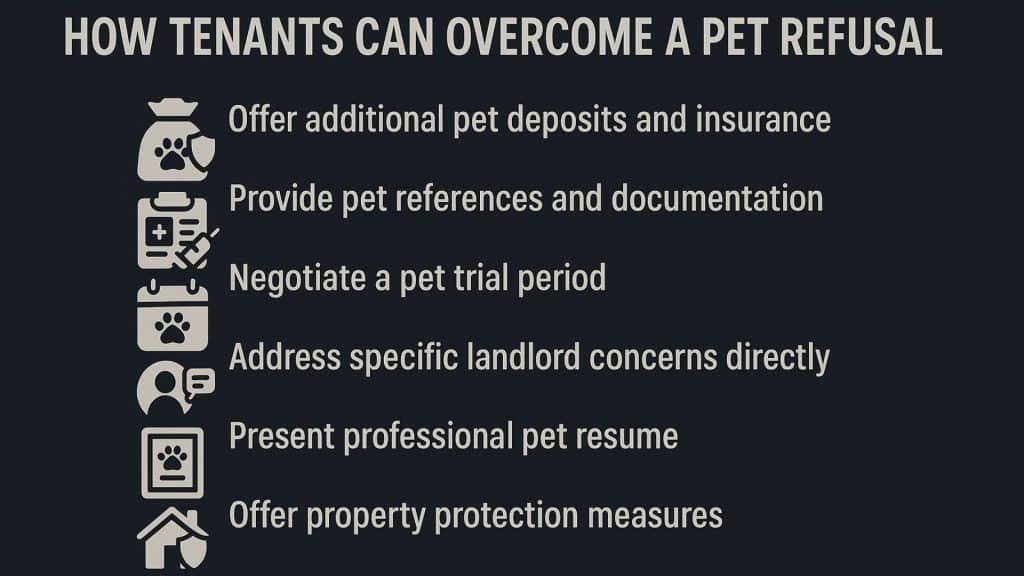Searching for pet-friendly rentals feels like finding a needle in a haystack.
You’ve probably faced countless “no pets allowed” signs that crush your hopes of finding the perfect home for you and your furry companion.
But here’s what most renters don’t know Landlords can’t always refuse pets, and there are specific legal rules they must follow.
Comprehending these rental laws can save you months of frustration and help you find housing faster. You’ll learn exactly when landlords can legally say no, when they can’t, and how new legislation might change everything.
Let’s break down the legal facts about pet refusals so you can approach your housing search with confidence and know your rights as a tenant.
Can Landlords Refuse Pets? The Basics
Yes, landlords can refuse pets in most cases. They have the legal right to set “no pets” policies in their rental properties. This means they can reject your rental application simply because you own a cat, dog, or other animal.
However, there are important exceptions. Landlords must allow service animals and emotional support animals under disability laws. These aren’t considered regular pets.
Some landlords do accept pets but charge extra fees. You might pay a pet deposit, monthly pet rent, or both. Pet deposits typically range from $200-500.
The rules vary by state and local laws. Some cities have tenant-friendly regulations that limit pet restrictions. Always check your local housing laws and ask about pet policies before applying for rentals.
Now that you know the basic rules, let’s look at the specific situations where landlords can legally say no to your furry friend.
When Can Landlords Refuse Pets?
Now that you know the basic rules, let’s look at the specific situations where landlords can legally say no to your furry friend.
Comprehending these reasons can help you prepare better applications and find pet-friendly housing faster.
- No Pet Policies Are Legal: Most landlords can create and enforce “no pets allowed” rules. This is their property right. They don’t need to give you a reason for refusing pets. The lease agreement will clearly state if pets are banned.
- Property Damage Concerns: Landlords worry about pet damage to floors, walls, and carpets. Scratches, stains, and odors can be costly to fix. They can refuse pets to protect their investment and avoid repair bills.
- Insurance Restrictions: Many landlord insurance policies exclude certain dog breeds or ban pets entirely. If their insurance won’t cover pet-related incidents, landlords must refuse to allow pets to stay.
- HOA and Building Rules: Homeowners associations and condo buildings often have strict pet restrictions. Landlords must follow these rules even if they personally allow pets. They have no choice but to refuse.
- Neighbor Complaints: Landlords can refuse pets to prevent noise complaints and tenant disputes. Barking dogs and loud animals can cause problems with other renters. This protects the landlord’s relationship with all tenants.
- Size and Weight Limits: Some landlords set pet size restrictions instead of outright bans. They might refuse large dogs but allow small cats. Weight limits of 25-50 pounds are common in pet-friendly rentals.
- Breed Restrictions: Certain dog breeds are often banned due to insurance or liability concerns. Pit bulls, Rottweilers, and German Shepherds face frequent restrictions. Landlords can refuse specific breeds while allowing others.
These are the main reasons landlords can refuse your pet application. While it might seem unfair, landlords have valid concerns about damage and costs.
The good news? Knowing these reasons helps you find better solutions and improve your chances of getting approved.
Can Landlords Refuse Pets Under the Renter’s Rights Bill?
The Renter’s Rights Bill introduces significant changes to pet policies in rental properties. Under this proposed legislation, landlords cannot automatically refuse pets without valid reasons.
The bill aims to make renting fairer for pet owners while still protecting landlords’ legitimate interests. This represents a major shift from current practices, where landlords could impose blanket pet bans.
Key Changes Under the Renter’s Rights Bill
The Renter’s Rights Bill introduces major reforms that shift power from landlords to tenants, ending no-fault evictions and strengthening tenant protections across England.
- Default Pet Permission: Landlords must allow pets unless they have reasonable grounds to refuse
- Written Justification Required: Refusals must be backed by specific, documented reasons
- Property-Specific Reasons: Landlords can only refuse if the property is genuinely unsuitable for pets
- Insurance Considerations: Valid insurance restrictions remain acceptable grounds for refusal
- Damage Protection: Landlords can still require pet deposits and insurance coverage
- Reasonable Restrictions: Size limits and breed restrictions may still apply if justified
The Renters’ Rights Bill could make pet ownership much easier for tenants. While landlords will still have some refusal rights, they’ll need solid reasons instead of blanket bans.
Keep an eye on this legislation as it moves through the approval process.
Can Landlords Refuse Pets That Are Service Animals or ESAs?
No, landlords cannot refuse service animals or emotional support animals (ESAs) even if they have strict “no pets” policies. These animals are not considered pets under federal disability laws.
The Fair Housing Act and the Americans with Disabilities Act protect your right to live with these animals.
Landlords must make reasonable accommodations for people with disabilities who need these animals for daily living or medical support.
1. Service Animals Have Full Protection
Service animals are specially trained dogs that perform specific tasks for people with disabilities. They can guide blind individuals, alert deaf people to sounds, or detect seizures.
Landlords cannot charge pet fees, deposits, or monthly rent for service animals. They must allow these animals in all housing, including properties with no-pet policies.
2. ESAs Need Proper Documentation
Emotional support animals provide comfort through companionship for people with mental health conditions. You need a letter from a licensed mental health professional to qualify.
This letter must state that you have a disability and need the animal for emotional support. Landlords can request this documentation, but cannot charge pet-related fees.
3. Limited Grounds for Refusal
Landlords can only refuse service animals or ESAs in very specific situations. The animal must pose a direct threat to others or cause significant property damage.
The landlord needs clear evidence of aggressive behavior or destruction. They cannot refuse based on breed, size, or general assumptions about the animal.
4. Reasonable Accommodation Process
You should inform your landlord about your need for a service animal or ESA before moving in. Provide proper documentation for ESAs when requested.
The landlord has a duty to work with you on reasonable accommodations. This process protects both your rights and the landlord’s legitimate business interests.
Can Landlords Refuse Pets? Best Practices for Landlords
If you’re a landlord trying to balance pet policies with property protection, you need clear strategies. Smart pet policies can help you attract quality tenants while minimizing risks and maintaining your investment.

Following these best practices helps you create fair pet policies that work for everyone.
Clear communication and proper documentation protect your property while building positive relationships with responsible pet-owning tenants.
How Tenants Can Overcome a Pet Refusal?
Getting a “no” doesn’t have to be the end of your pet-friendly housing search. Many landlords will reconsider their decision if you can address their main concerns. Here are practical ways to turn that rejection into approval.
- Offer Additional Pet Deposits and Insurance: Propose higher security deposits, monthly pet rent, or comprehensive pet liability insurance to address landlord concerns about potential damage and financial risk.
- Provide Pet References and Documentation: Share veterinary records, training certificates, previous landlord recommendations, and proof of spay/neuter status to demonstrate your pet is well-behaved and properly cared for.
- Negotiate a Pet Trial Period: Request a 3-6 month trial period where the landlord can evaluate your pet’s behavior and your responsibility as a pet owner before making a permanent decision.
- Address Specific Landlord Concerns Directly: If insurance or HOA rules are the issue, help research pet-friendly insurance options or work with the landlord to find compliant solutions within building restrictions.
- Present Professional Pet Resume: Create a detailed profile including your pet’s age, training history, temperament, size, and any special certifications to show you’re a responsible pet owner.
- Offer Property Protection Measures: Suggest professional carpet cleaning services, regular property inspections, or agree to repair any pet-related damage above normal wear and tear at your own expense.
Don’t give up after the first “no.” Being proactive and professional shows landlords you’re a responsible pet owner.
These strategies won’t work every time, but they significantly improve your odds of finding a home that welcomes both you and your pet.
Conclusion
Pet refusal laws are complex, but knowledge is your best tool. Landlords can legally refuse pets in many situations, from insurance restrictions to property damage concerns.
However, they cannot refuse service animals or ESAs, and new legislation may limit blanket pet bans.
Remember these key points: always ask about pet policies upfront, understand your local laws, and know when refusals are illegal. If you face rejection, consider negotiating with higher deposits, providing pet references, or offering trial periods.
What’s your next move?
Start researching pet-friendly landlords in your area and prepare documentation that shows you’re a responsible pet owner.
Have you tried any of these strategies in your housing search? Share your experiences in the comments below.
Want to get the legal or money stuff right? Read more here.















